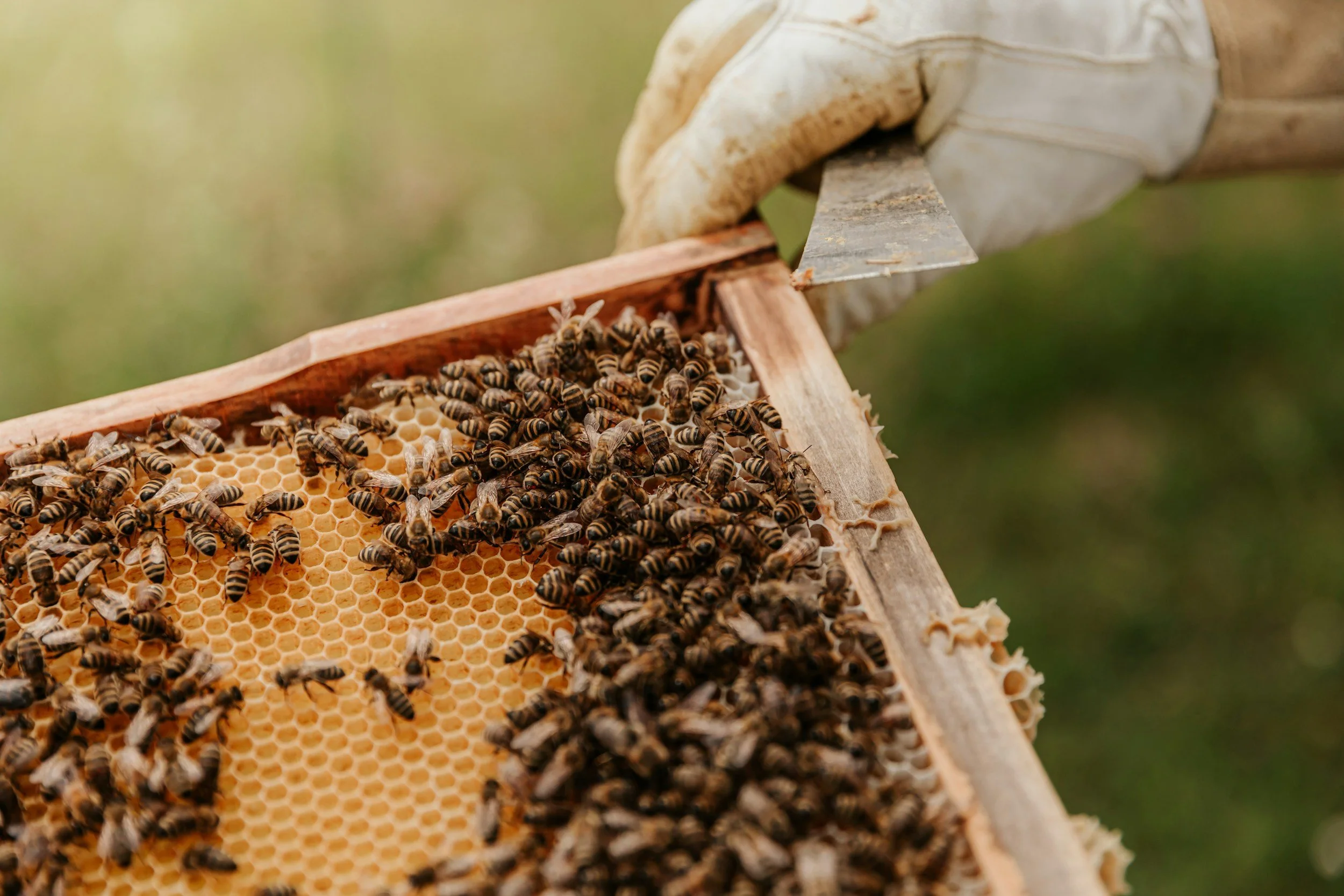The Honey
All of the honey that we produce is from Northeastern Illinois. Our bees are located in the Western Suburbs of Chicago. So, if you live anywhere in Northeastern Illinois our honey will be the best honey for you!
We sell raw honey that is as close as you can get to being right out of the hive. This means that we do not pasteurize our honey. Pasteurization occurs when the honey is heated to 150 degrees Fahrenheit for a period of time, usually 30 minutes. Our honey never gets that hot! Nearly all store-bought honey has been heat treated like this. Heat treating make the honey darker, changes the molecular makeup of the honey, and can lower its benefits to you.
Our honey is not filtered. We only run it through screens to remove wax, bee parts, and any other debris that you do not want to eat. This means that our honey still has local pollen in it. Honey purchased in the store is not only heated but filtered to remove all solids, including pollen. This changes the honey and it removes beneficial ingredients that make honey great.
We offer liquid honey in traditional glass jars, plastic bottles, and honey bears, as well as some specialty jars.
We produce a limited quantity of cut comb and round comb honey each year. Production is variable based on weather conditions and nectar flows. This is the purest form of honey that anyone can get since it is still in the comb that the bees built to store it in.
We have creamed honey made out of our honey. This is also known as whipped honey, spun honey, churned honey, honey fondant, and (in the UK) set honey. Because our creamed honey is made from our liquid honey, it unpasteurized. The only thing added is a starter of already made creamed honey to get the liquid honey to crystalize quickly and properly.
Pure raw honey will never spoil, but it will crystalize. This is ok, as that is one way that you will know that it is the good stuff! If you would like to liquify it just put it in a pot of water that is not hotter than 120 degrees Fahrenheit. We prefer glass jars over plastic for liquifying honey. You must be extra careful with plastic. Never microwave your honey! Microwaves will almost always overheat and ruin your precious honey.
The Beekeepers
The Two Beekeepers, Lori Otey and Martin Szudarski, met in college. They have now known each other for over twenty-five years and have many shared interests. Marty took Lori out to the farm where he worked and Lori learned about running machinery and the various animals that can be on a farm. Marty learned about amateur radio and becoming a licensed radio operator.
Lori is a self starter and able to work on her own to solve tough problems. Even though she can be serious, she has a tendency to provide comic relief to lighten tense situations. She is trying to rediscover the domestic arts. Her grandma taught her how to sew and cross stitch when she was young, but has taught herself how to knit. She is currently learning how to can vegetables and has successfully canned beets and tomatoes. You can read about her adventures on her facebook profile. Currently she is practicing on store bought foods, but hopes to eventually be able to move on to larger acreage so she can have her own garden.
Lori is developing traditional and old-fashioned farming skills. Honeybees are not her only interest. She is very interested in raising meat chickens, laying chickens, beef steers, sheep, goats, and pigs.
She hopes that her love of honey is stronger than her fear of bees. But then again, when you are wearing a protection suit you do feel invincible.
Marty Szudarski grew up in rural Illinois. He spent 10 years in the Will County 4-H program. Martin was a member of the Peotone FFA Chapter and eventually earned the American FFA Degree. The American Degree is the highest award that can be earned by a member of the Future Farmers of America. His projects in 4-H and the FFA included Fruit and Vegetable Production, Woodworking, Mechanics, and technology related projects. While in High School and College he worked as a farm hand operating and repairing farm machinery. He earned a Bachelors of Science degree in Computer Science from Bradley University in Peoria, Illinois and later went on to earn a Master’s of Science in Computer Science from Governors State University in University Park, Illinois. He has been a member of the Will County Threshermen Association for almost twenty years and is active in putting on their annual show.
Marty has worked on computers as a Systems Engineer in Wheaton, Illinois since 2002. Even though his full time job keeps him in front of a computer screen most of the day, he still enjoys and is drawn to activities related to production agriculture. He regularly visits his friends that still own or operate farms in his home town. As a natural problem solver, Marty often figures out the best way to do things by research and experimentation. This is the way beekeepers and farmers learn what works best for their operation. Beekeeping will provide Marty with an activity in the field of production agriculture once again.
Lori and Marty desire to learn all that they can about beekeeping. They even desire to eventually try to obtain a Master Beekeepers Certificate.

